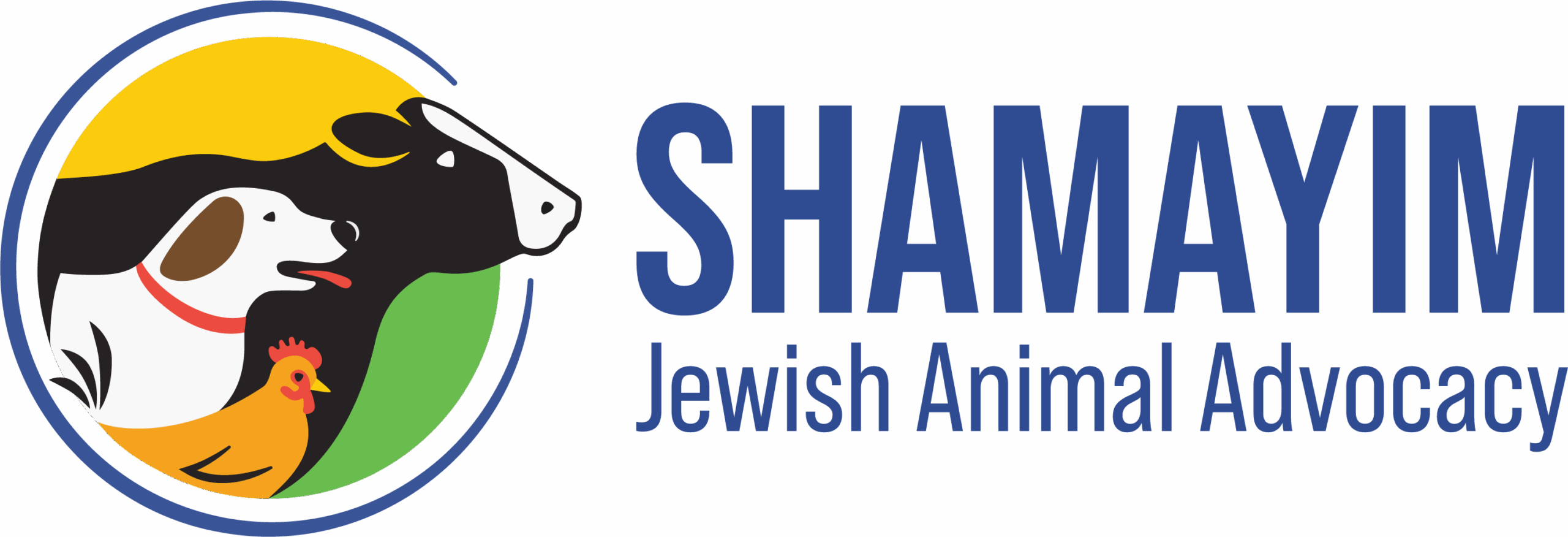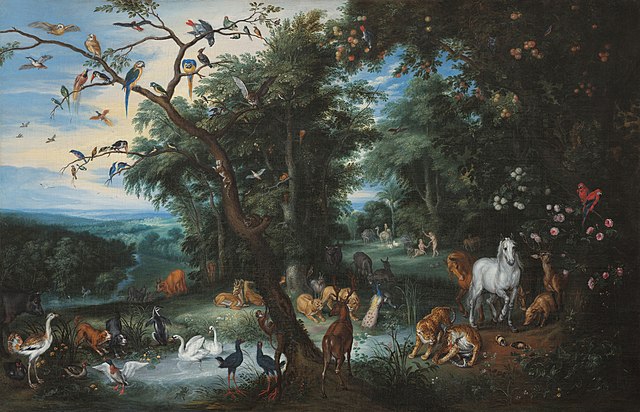How does Judaism view animals? Does Judaism prioritize animal welfare, animal rights, or animal liberation? The honest answer is: it depends when you’re asking.
The Torah isn’t frozen in time. It breathes. It speaks differently in each generation, evolving with the moral conscience of its people. We’ve witnessed an ongoing evolution in how animals are perceived in Jewish life. There have been moments of regression, but also the stirring of moral progress. Let’s break down what that evolution looks like, beginning with the dawn of humanity.
Gan Eden: The Birthplace of Animal Liberation
In the beginning, animals were not food. Genesis 1:29–30 paints a picture of peaceful coexistence, where both humans and animals are given “every seed-bearing plant” to eat. No blood is spilled, no hierarchy enforced. There is no permission to kill, only to coexist. The first humans lived in harmony with the animal world, not as rulers, but as equals.1
Before Adam’s sin, before exile, before sacrifice … there was animal liberation.
Sacrifice and the Shift to Animal Welfare
Then came the flood. It was only during the Noahic era when Judaism had to alter its perspective of animal ethics. Because human morale was so low, now animals were considered lesser and to be dominated, stripping them from any autonomy of life. Hashem allows meat consumption for the first time in Genesis 9:3:
“Every creature that lives shall be yours to eat; as with the green grasses, I give you all these.”2
But even through this domination, Kosher laws were put into place to enable a level of mindfulness in the act of sacrifice … through a lens of animal welfare.
Kashrut and sacrificial offerings known as “korbanot” offer structured restraint, reassuring the consumer that there is no unnecessary suffering, no cruelty in slaughter, and no casual consumption.
Later, rabbinic halakhah elaborates a detailed welfare-based system: tza’ar ba’alei chayim (prohibition of animal cruelty), the requirement to feed animals before oneself, and the principle of minimizing pain3. We see time and time again these ethical compromises in order to prioritize the welfare of animals. But although rooted in compassion … it is still centered on human use.
Animal Agriculture and the Shift to Animal Rights
We began in liberation, descended into control, wandered through compassion, and now we stand at an ethical crossroads.
Today we’ve now shifted to an entirely new way of life that puts basic animal welfare into question. The challenges we are now facing, specifically with animal agriculture, demand much more from us.
Kosher laws only satisfy part of a bigger picture of factory farming. And even when technically Kosher, a Kosher certification may only regulate how an animal is killed, but it often cannot account for the horrors of how it lived.4
Investigations by groups like Animal Equality have documented systemic abuse within kosher and non-kosher facilities alike: tail docking, forced insemination, debeaking, gestation crates, and physical abuse.5
This lowpoint has galvanized new discussions. We’re no longer only asking how we treat animals. We’re asking whether we should be using them at all. This is where the language of animal rights comes into play.
Mock meats, cell-based agriculture, and plant-based alternatives challenge the centuries-old assumption that animal use is necessary anymore. In 2024 alone, the plant-based food market surpassed $12 billion globally, with Israel leading innovation in cultured meats6. Jewish organizations such as Shamayim and Jewish Veg have embraced these changes as ethical, environmental, and spiritually aligned choices.
Even halakhic authorities have begun grappling with this shift. Can lab-grown meat be considered pareve?
Yemot HaMashiach and the Return to Animal Liberation
One day, as prophetic visions state, there will be a full-circle moment. Jewish tradition doesn’t end with compromise, but returns to a world of complete animal liberation.
A world where violence is no longer necessary, where the fear of death is lifted even from the animal realm. Just as it was at the very beginning.
Rav Kook, one of the boldest rabbinic voices on this, saw the Messianic era as a time when humanity would evolve past the need to kill for food, or even to assert dominion.
In his work, “Vision of Vegetarianism and Peace,” Rav Kook writes:
“The lofty moral state of man will cause him to detest eating the flesh of animals, because by nature, the human soul is not capable of consuming meat for nourishment without moral repulsion.”7
In the days to come, sacrifices will be annulled, not out of rejection, but because the world no longer needs them. The violence once permitted as a concession to human weakness will no longer be relevant to redeemed humanity, and as stated in Isaiah 11:6–9:
“The wolf shall dwell with the lamb… They shall not hurt nor destroy in all My holy mountain.”8
Between the Garden and the Mountain
From Eden, through Sinai, toward Zion, it’s evident that Judaism is not monolithic in its view of the animal kingdom. It moves across time between use and respect, dominion and solidarity. But it begins and ends with visions of animal liberation. Sandwiched in between, in today’s world with advanced technologies and industries that have far outpaced halakhic assumptions, Judaism faces new questions … ones that require a renewed ethical imagination.
So if animal rights asks us “What do animals deserve?”, and animal welfare asks “How should we treat them?”, perhaps Judaism adds a third, uniquely sacred question: “What kind of humans are we becoming in how we treat those who can’t speak back?”
- Genesis 1:29–30
↩︎ - Genesis 9:3 ↩︎
- Babylonian Talmud, Berakhot 40a; Shabbat 128b; Deuteronomy 22:6–7. See also: Maimonides, Mishneh Torah, Laws of Shechita.
↩︎ - Nathan Lopes Cardozo, Jewish Law as Rebellion, Ch. 9: “Kashrut and Compassion.” ↩︎
- “Abuse Exposed in Kosher Slaughterhouses,” Animal Equality (2021)
↩︎ - The Good Food Institute, “2024 State of the Industry Report – Plant-Based,” https://gfi.org.
↩︎ - Rav Avraham Yitzchak HaCohen Kook, A Vision of Vegetarianism and Peace
↩︎ - Isaiah 11:6–9 ↩︎





Leave a Reply